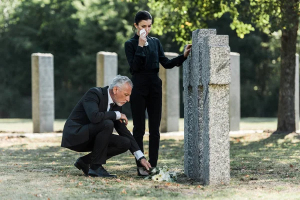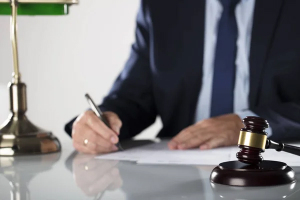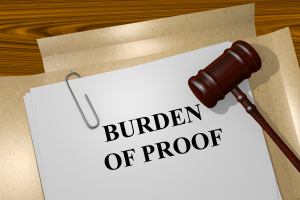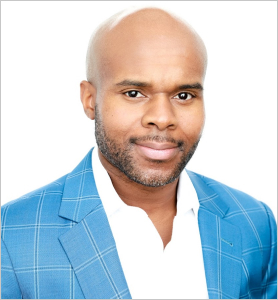
Did you lose a spouse or family member in an accident or other adverse event? Depending on how the fatal injury was inflicted on your family member, you may be able to pursue civil justice if a defendant's negligence caused your loved one's death.
However, not all deaths will qualify as California wrongful death cases. To file wrongful death claims, the decedent's surviving family members have to prove that someone else's negligence caused a victim's death.
Under California law, negligence can play a role in civil and criminal cases if a defendant's actions or negligent behavior led to her loved one's death. But whereas cases of involuntary manslaughter caused by a defendant's negligence are prosecuted in criminal court (and can result in prison time upon conviction), wrongful death cases filed by wrongful death lawyers are adjudicated in the California civil court system.
It can be quite challenging to prove wrongful death claims. For plaintiffs to prevail in their wrongful death claims, they or their wrongful death attorney must be able to directly link the defendant's negligence to the fatality.

So, how does one prove a wrongful death occurred? The burden of proof is on the plaintiff's wrongful death attorney to establish the below three legal elements when trying to prove that a defendant failed to use reasonable care to avoid causing a loss of life.
What is negligence in a wrongful death action? To win a California wrongful death case, plaintiffs have a lower burden of proof in civil court than in criminal court. But they must still prove to the court that the defendant acted negligently "by a preponderance of the evidence."
Does that mean that the defendant's negligence was intentional? It might have been, but negligence does not necessarily need to be intentional for the deceased person's surviving family members to file a wrongful death lawsuit. A defendant's unintentional negligence or reckless, intentional acts can satisfy the threshold of legal negligence in a wrongful death case.
Before filing a wrongful death lawsuit, plaintiffs must demonstrate to the court that the defendant owed a duty of care to the person who died when the defendant breached their duty. That can play out in various ways, but we will use two examples where a defendant's breach could generate a wrongful death claim.
If a husband or wife gets killed in a car accident with a drunken driver, a skilled litigator could prove a wrongful death occurred due to the intoxicated motorist's breach of duty to obey traffic laws and drive safely and responsibly. The surviving spouse could be awarded a significant sum to cover any medical expenses incurred by the decedent before they passed away.
Plaintiffs in wrongful death cases can also recover funeral expenses and even future financial support if their families' wage earners die in car accidents caused by a defendant's breach of duty.
The second example is a typical civil claim of medical malpractice in a wrongful death case filed by the deceased patient's surviving family members. If the physician, nurse, pharmacist, or other health care provider committed a wrongful act in their diagnosis or treatment of the patient or dispensed the wrong medication or dosage, these examples of negligence can lead to winnable wrongful death lawsuits.
Not every collision or adverse medical outcome proves that a defendant breached their legal duty of care to the decedent. Just because your wife, husband, or other loved one died in an accident involving another person does not give you automatic grounds to file wrongful death lawsuits.
To prevail in a wrongful death case, those pursuing legal action must show a clear link between the responsible party's negligence and the decedent's death. That link is called "causation," an essential component of every viable wrongful death claim filed in the California civil court system.
The final element needed when proving the other party's negligence in a wrongful death lawsuit is that any of the damages resulting from the decedent's death were due to the negligent act by the at-fault party.
Damages are essential when filing a personal injury lawsuit or litigating a wrongful death case. But not every plaintiff realizes that damages encompass more than the surviving parties' economic losses.
Any pain and suffering endured by the deceased person after they were injured in the accident or incident but before they passed away can be quantified and calculated. It may seem impossible to price pain and suffering, but the California courts know how to assess these values in wrongful death lawsuits.
Survivors often suffer damages in the form of a loss of emotional and physical support and the financial support they receive. Surviving family members can file a wrongful death lawsuit if their spouse or other loved one is no longer alive to provide them with the love and emotional support they formerly relied upon.
Alternatively, damages from wrongful death lawsuits can arise from losing a spouse's contributions to the upkeep and maintenance of the home and/or childcare duties. Wrongful death settlements are not paid to the deceased person's estate. Instead, the surviving family member receives a portion of the negotiated settlement allotted to them by the insurance company for the responsible party.
When wrongful death attorneys discuss comparative negligence, what does that mean? Unlike many of the other states, here in the state of California, litigation follows a doctrine of pure comparative fault. This is a decidedly more liberal fault rule.
Under California law, the negligence of the plaintiff for any contribution (up to 99%) of their fault for the accident that killed them can be used to negate the liability of the at-fault party in medical malpractice cases, car accidents, and even personal injury cases that don't result in death.

The plaintiffs who seek justice by filing a wrongful death lawsuit have the legal duty to bear the burden of proof in wrongful death cases filed in the California civil courts. If they can prove, the defendant is liable for the breach of duty for the wrongful act that killed their loved one, they or their wrongful death lawyer can file a wrongful death claim.
Why is proof of negligence so vital in a wrongful death lawsuit? Without this essential component, the surviving spouse or the dependents of the deceased will not prevail in their wrongful death lawsuit. Let's examine further the significance of proof of negligence in these legal matters.
If wrongful death attorneys can establish a defendant's liability in a wrongful death lawsuit, the survivors have a clear path to a negotiated settlement or courtroom verdict.
Proving negligence opens the door to fair and just compensation for the victim's survivors and loved ones. While unexpected deaths may be tragic, not all will lead to a financial settlement or judgment for those left behind in the wake of their spouse, child, parent, or dependent death.
Fighting for this compensation is important when the survivors will otherwise suffer financially from losing the decedent. This is especially evident in cases where the victim was a primary wage earner for their family. Without the steady revenue source they brought home, their spouse and children could lose their homes if they can no longer pay the mortgage. Their standard of living can drop sharply, further adding to the emotional losses the survivors grapple with.
A wrongful death lawsuit holds the negligent party accountable for the damage they caused, resulting in the loss of life and all subsequent losses suffered by the decedent's survivors. No sum of money can ever truly compensate for the loss resulting from the intentional harm they inflicted or the breach of duty of care they had for the victim.
But a negotiated settlement or judgment handed down by a California court can go a long way toward easing the uncertain future faced by the survivors of the one who died in the accident or the incident of medical malpractice.
Holding defendants who had a duty of care to uphold and those who caused intentional harm to the victim responsible for the acts that caused a victim's wrongful death can be a powerful deterrent. It can deter the specific defendant in the case from repeating a similar breach of their duty of care or intentional act. But it also can serve as a powerful lesson to others that they, too, could wind up as defendants in a wrongful death lawsuit if they commit similar acts of negligence.

If the victim succumbed to their injuries, they obviously could not testify about the guilt of the defendant being sued in a wrongful death lawsuit. How, then, can negligence be established in these serious cases?
Below are some evidence the California civil courts rely on when determining negligence in a case.
Any eyewitnesses to fatal wrecks can be subpoenaed by the personal representative of the decedent's estate to testify to what they saw occur.
An attorney for surviving plaintiffs can call experts to the stand who can offer their testimonies regarding the circumstances of the case. Their testimony can carry more weight than eyewitness testimony, which may conflict due to different individuals' perceptions of the same events.
Of all types of evidence used in court to prove liability in wrongful death actions, documentary evidence is the easiest to establish. Documentary evidence is precisely what it sounds like -- proof of documented losses, e.g., ambulance and hospital bills if the decedent survived the initial accident or incident before later passing away from their injuries.
Funeral or cremation costs and other final expenses of the deceased are other examples of documentary evidence that can be used in a case of wrongful death that is filed within the California statute of limitations, which is typically two years from the date of the incident or accident that claimed the victim's life.
What happens when the lawsuit for wrongful death is not filed within the two-year statute of limitations? Unfortunately, with very few exemptions, plaintiffs lose all rights to pursue compensation if the statute of limitations has passed.
Wrongful death cases are complex to litigate. Most survivors require the services of a skilled and knowledgeable attorney dedicated to seeking justice for those left behind in the wake of their loved one's untimely demise due to the negligence of the liable party.

At Omofoma Law, we offer clients a free consultation for personal injury and wrongful death cases. Unless you win, you owe nothing. Call (213) 455-4050 to learn how we can help.


Request Your
Free Consultation
"*" indicates required fields